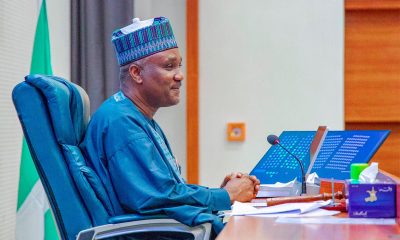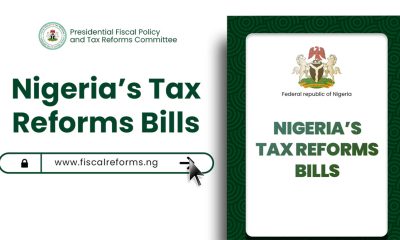Business
N30,000 minimum wage binding on all employers – FG

The N30,000 national minimum wage is binding on all employers of labour, including state governments and the private sector, the Federal Government has said.
President Muhammadu Buhari stated this on Saturday in Abuja during the Workers’ Day celebrations.
He spoke through Minister of Labour and Employment, Senator Chris Ngige, stressing that the minimum wage law signed in 2019 was a national law that everyone must obey.
Buhari said, “Private sector and state governors are bound by the laws, because we have workers as prescribed in that law. So, it is not a question of pick and choose. We moved the national minimum wage from N18, 000 per month to N30,000. It is an irreducible plus. Therefore, we expect them and the people in the private sector to comply.”
He also told the workers that the FG was against any attempt to remove the national minimum wage from the exclusive list, adding that the issue of pension minimum wage was backed by the constitution, and every employer was bound by it. The FG, he said, would pay all minimum wage arrears owed pensioners from 2019 to date.
“All pensioners in the federal civil service are to get their arrears paid beginning from May 1, 2021,” Buhari said.
He noted that although the negative effects of the COVID-19 pandemic were monumental, the government had tried to cushion the effects of the disease without reducing incomes.
This was made possible, he said, through the diversification of the economy, thus keeping the country afloat.
Buhari listed some of policies being executed by his administration to create jobs and empower the populace.
He said, “While awaiting the formalisation of our social protection network and people’s welfare, we have not and will not rest on our oars in combating the challenges of our time occasioned by COVID-19 pandemic.
“We have in our place some social-economic policies to alleviate poverty and ours include but not limited to the expansion of the Conditional Cash Transfers for the vulnerable poor from 2.6 million households (13 million persons) to 7.6 million households (32 million) and COVID-19 Rapid Response Register for urban poor, which now has 4.8 million households (20 million).”
The president said the government, through the Federal Ministry of Trade and Investment, was implementing the Entrepreneur Support Programme, Artisanal Support Fund, and Payroll Support Fund for small-scale businesses.
In a message jointly signed by the President of NLC, Ayuba Wabba, and President of TUC, Quadiri Olaleye, the leadership of organised labour lamented the poor conditions Nigerian workers had been subjected to.
They alleged countless violations of human, workers, workplace and trade union rights all over Nigeria in the last one year.
They said the situation was compounded by the health and socio-economic effects of the COVID-19 pandemic, which led to the loss of millions of jobs and subsequently pushed about 27 million Nigerians into poverty.
Wabba said this year’s May Day was dedicated to brave women and men, who paid the supreme price in the performance of their jobs, contracted the coronavirus, and suffered life-lasting complications as a result.
“We must say that our country has not made the desired progress in protecting workers and the Nigerian people from the impact of COVID-19, which has brought with it daunting challenges for Decent Work, Social Inclusion cum Protection and Distress on peoples’ welfare,” he stated.
Wabba added, “Despite the best efforts of government, organised labour, and private sector employers, millions of Nigerian workers have lost their jobs, their means of livelihood and have slipped into destitution, lack and misery. The weakness of our social protection system has aggravated the pain and frustration of our compatriots.”
Olaleye said labour was proffering alternative policy options to government to consider in order to save the country from the current difficult situation.
He said rather than help businesses to grow, agencies of government had been stifling the small-scale businesses through multiple taxation, leaving the economy and Nigerians strangulated and impoverished.
The TUC president said government should see the need for expansionist policies to restore the essential role of the state in the protection of essential public goods, notably health, education, jobs, and sound management of the petroleum and power sectors.
On the removal of petrol subsidy, Olaleye said organised labour was pushing for production cost and pricing method as against the existing import-parity model, which had bled Nigeria of humungous forex.
He urged the government to implement a three-year suspension of increase in gas price to help stabilise the cost of electricity tariff in the country.
“With the savings made, the cost of the electricity tariff could be reduced by N10.50 across the high price bands,” he said.
Representative of the Senate President, and Chairman, Senate Committee on Labour, Senator Godiya Akwashiki, said the National Assembly was always willing to partner the leadership of the workers in safeguarding the wellbeing of workers and ensuring industrial stability.
Secretary to the Government of the Federation, Boss Mustapha, commended Nigerian workers for standing with the FG during the challenging period of the outbreak of COVID-19.
Railway
Lagos Rail Mass Transit part of FG free train ride – NRC

Lagos Rail Mass Transit part of FG free train ride – NRC
The Nigerian Railway Corporation (NRC) has disclosed that the Lagos Rail Mass Transit (LRMT) trains are included in the Federal Government’s free train ride initiative for the Christmas and New Year celebrations.
The LRMT, which currently includes the Phase 1 Blue Line Rail and the Phase 1 of the Red Line Rail, operates under the Lagos Metropolitan Area Transport Authority (LAMATA).
This announcement was made by Ben Iloanusi, the Acting Managing Director of the NRC, during an interview on NTA News TV on Friday, following the launch of the initiative earlier that day.
While Iloanusi stated that Phase 1 of both the Blue Line and Red Line Rail projects are part of the program, LAMATA has yet to confirm this inclusion.
READ ALSO:
- Nigeria denies alleged plot to destabilise Niger Republic
- Navy arrests 19 Nigerians attempting to reach Europe by hiding on ship
- Troops arrest four Ambazonian rebels in Taraba
Iloanusi outlined the other routes benefiting from the scheme, which include the Lagos-Ibadan Train Service, Kaduna-Abuja Train Service, Warri-Itakpe Train Service, Port Harcourt-Aba Train Service, and the Bola Ahmed Tinubu Mass Transit in Lagos. Notably, little was previously known about the Bola Ahmed Tinubu Mass Transit service until this disclosure.
“Let me mention the routes where this free train service is happening. We have the Lagos-Ibadan Train Service, we have the Kaduna-Abuja Train Service, we have the Warri-Itakpe Train Service, we have the Lagos Rail Mass Transit trains, we have the Port Harcourt-Aba Train Service, and we have what we call the Bola Ahmed Tinubu Mass Transit, which is also in Lagos,” he stated.
Iloanusi provided operational updates, stating that passengers nationwide can access free tickets online or, for those unable to do so, at train stations where they will be profiled and validated.
He noted that passengers using NRC-managed services (excluding the Lagos Rail Mass Transit) should reserve tickets via the official website, www.nrc.gov.ng, with a valid ID required. He also advised travelers to plan, arrive on time, and bring valid identification.
Lagos Rail Mass Transit part of FG free train ride – NRC
Business
NNPC denies claim of Port Harcourt refinery shutdown

NNPC denies claim of Port Harcourt refinery shutdown
The Nigerian National Petroleum Company Limited (NNPCL) has denied claims in media reports that the newly refurbished Port Harcourt refinery has shut down.
The national oil company denied the claim in a press release issued by its Chief Corporate Communications Officer, Olufemi Soneye, on Saturday.
Soneye said the claim was false and urged Nigerians to disregard it. He stressed that the Port-Harcourt Refinery is fully operational.
READ ALSO:
- Like Ibadan, stampede claim 10 lives for Abuja Catholic church, 17 in Anambra
- Marketers react after NNPCL slashes petrol price to N899 per litre
- Electricity: We installed 184,507 meters, issued 50 licences in Q3, says FG
The statement read, “The attention of the Nigerian National Petroleum Company Limited (NNPC Ltd.) has been drawn to reports in a section of the media alleging that the Old Port Harcourt Refinery which was re-streamed two months ago has been shut down.
“We wish to clarify that such reports are totally false as the refinery is fully operational as verified a few days ago by former Group Managing Directors of NNPC.”
He noted that preparation for the day’s loading operation is currently ongoing, and added that claims of the shutdown are “figments of the imagination of those who want to create artificial scarcity and rip-off Nigerians.”
NNPC denies claim of Port Harcourt refinery shutdown
Business
CBN permits BDCs to buy up to $25,000 FX weekly from NFEM

CBN permits BDCs to buy up to $25,000 FX weekly from NFEM
The Central Bank of Nigeria (CBN) has granted Bureau de Change (BDC) operators temporary permission to purchase up to $25,000 weekly in foreign exchange (FX) from the Nigerian Foreign Exchange Market (NFEM).
The Central Bank of Nigeria (CBN) has granted Bureau de Change (BDC) operators temporary permission to purchase up to $25,000 weekly in foreign exchange (FX) from the Nigerian Foreign Exchange Market (NFEM).
This move, detailed in a circular dated December 19, 2024, is designed to meet seasonal retail demand for FX during the holiday period.
The circular was signed by T.G. Allu, on behalf of the Acting Director of the Trade and Exchange Department.
The arrangement will be in effect from December 19, 2024, to January 30, 2025.
Under the directive, BDCs may purchase FX from a single Authorized Dealer of their choice, provided they fully fund their accounts before accessing the market.
Transactions to occur at the prevailing NFEM rate
The transactions will occur at the prevailing NFEM rate, and BDCs are required to adhere to a maximum 1% spread when pricing FX for retail end-users.
READ ALSO:
- Badenoch’s negative portrayal of Nigeria Police unfair-PCRC
- Bitcoin price crashes to $95,000 as market continues to react to Federal rate cuts
- Bauchi high court dismisses blasphemy, cybercrime charges against Rhoda Jatau
All transactions conducted under this scheme must be reported to the CBN’s Trade and Exchange Department.
The circular read in part:
“In order to meet expected seasonal demand for foreign exchange, the CBN is allowing a temporary access for all existing BDCs to the NFEM for the purchase of FX from Authorised Dealers, subject to a weekly cap of USD 25,000.00 (Twenty-five thousand dollars only).
This window will be open between December 19, 2024 to January 30, 2025.
“BDC operators can purchase FX under this arrangement from only one Authorized Dealer of their choice and will be required to fully fund their account before accessing the market at the prevailing NFEM rate. All transactions with BDCs should be reported to the Trade and Exchange department, and a maximum spread of 1% is allowed on the pricing offered by BDCs to retail end-users.”
The CBN assured the general public that PTA (Personal Travel Allowance) and BTA (Business Travel Allowance) remain available through banks for legitimate travel and business needs.”
These transactions are to be conducted at “market-determined exchange rates” within the NFEM framework.
This initiative reflects the CBN’s strategy to stabilize the FX market and manage seasonal surges in demand.
CBN permits BDCs to buy up to $25,000 FX weekly from NFEM
-

 Railway15 hours ago
Railway15 hours agoLagos Rail Mass Transit part of FG free train ride – NRC
-

 metro2 days ago
metro2 days agoCourt stops customs from seizing imported rice in open market
-

 metro3 days ago
metro3 days agoFG transfers electricity market regulatory oversight in Lagos to LASERC
-

 metro2 days ago
metro2 days agoIbadan stampede: Tinubu orders probe as death toll hits 40
-

 metro2 days ago
metro2 days agoAfe Babalola: Court grants Dele Farotimi bail, barred from media interviews
-

 metro16 hours ago
metro16 hours agoNIMC warns against extortion, reaffirms free NIN enrollment
-

 metro1 day ago
metro1 day agoIbadan stampede: Ooni reacts after arrest of ex-wife
-

 News2 days ago
News2 days agoAdebayo Ogunlesi, 2 other Nigerians make Forbes 50 wealthiest Black Americans list 2024













